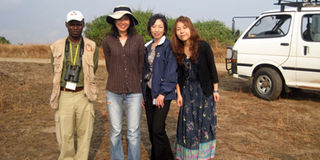Living his dream as a tour guide

Musinguzi (L) with some of his clients during a tour of Queen Elizabeth National Park last year. Courtesy PHOTO
What you need to know:
Reality. When Bosco Musinguzi enrolled at Kabale University for a degree in Tourism and Hotel Management, he knew he was closer to his childhood dream.
On Saturday morning while at Simba safari camp where we had gone for a weekend getaway, I was introduced to a gentleman who was to be our tour guide for the day.
He dons a round brown hut, long-sleeved grey shirt with khaki pants, complete with a khaki half jacket bearing the badge for the Uganda Safari Guide Association.
He is of medium height and strong bodied. His clothes almost make him look very big, given their almost over-size nature. He gets behind the wheel and drives us around the park as we go for our early morning game drive.
But more to him is his love for wild life that has seen him follow his child hood dream of being a tour guide.
Bosco Musinguzi has more than 14 years of experience as a tour guide around Queen Elizabeth National Park. He has vast knowledge about the different types of birds as he can literally tell you about the history of each bird species.
He is well known around the park. As we drive through, he keeps on stopping to either greet or acknowledge a person greeting him. This and the way he keeps on interacting with us, makes us feel at home, even among dangerous animals.
Musinguzi says being a tour guide is a very challenging job as you must always be in the know. In his years as a tour guide, he says tourists expect you to have answers to all their questions.
In this case, you have to know small bits about each and everything they ask.
“You have to read different books about these animals. This helps you to keep up to date,” he says.
Musinguzi reminisces how he was one day asked by a tourist if he knew the number of anthills on Queen Elizabeth National park, which sits on almost 1,980 square miles.
But the father of one has learnt to deal with all these questions, which have also propelled him to read further about the different animals. He explains that sometimes tourists ask one to test one’s capacity to find out if you are knowledgeable enough about the animals.
To be prepared for them, he has had to keep on enriching his knowledge of the different animals by taking courses. For instance, he has to always watch out for the different birds that keep on migrating from Europe to Africa, specifically to the park during some seasons.
In 2005, he undertook a course in animal behaviour to learn about the different types of animals. He also went back for a driver guide course in 2007, which improved on his knowledge about his line of work.
He undertook another course in bird watching in 2008 to learn more about the birds.
With the knowledge and experience that he had accumulated over the years, Musinguzi was led to start up his own tours and travel company in Kasese called Albert Safaris Ltd in 2012. Today, he employs four people.
“With the connections that I keep on getting each passing day, I hope to one day expand my company and also hopefully put up lodges to provide accommodation,” he says.
One of the strong points that have kept him going is striving to always give his clients the best services. This, he says, makes them leave satisfied and thus appreciate his work.
Who is bosco musinguzi?
Born in 1984 in Bushenyi District, Musinguzi completed his A-Level education at Ruyonza School in Bushenyi. He then followed his childhood dream by enrolling at Kabale University for a degree in Tourism and Hotel Management. This, he explains, was a result of his desire to study more about tourism and further his knowledge of the trade.
After University, Musinguzi was employed as a tour guide with Albertine Safari Camps. While there, he also doubled as a receptionist, when he was not in the field. He worked here for five years before joining the Mission Direct group in Rukungiri
Most memorable event
Attacked. Musinguzi reveals that one day, as he drove his clients around the park, he found an elephant in the middle of the road. “Elephants are the most destructive animals as they do not want to have any obstruction. That is why they uproot trees wherever they go, leaving a trail of their path,” he explains.
Seeing as elephants hate noise, he switched off the car engine, hoping for it to cross in peace, but it instead charged at them. It chased them for about two kilometres without giving up.
“I had to drive the car backwards, manoeuvring through potholes and making sure we move first enough to evade the beast.
“My main worry was the elephant catching up with us because with all the anger it had, it would have overturned the car. But we managed to evade it and it soon gave up the chase and went its own way. That was a very frightening experience for me,” he concludes.




